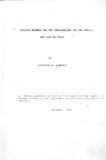| dc.description.abstract | This study examines the implications for the family when mothers are engaged in income-generating activities outside the home. It substantiates the mother's double role in the family, and documents the nature and magnitude of the difficult tradeoffs
mothers in urban areas face as a result of their participation in the job market. Analytic techniques have been used in this study to examine the mothers' household and nonhousehold
activities, and the way these activities intersect with and are affected by the presence and activities of other household members.
The study begins by identifying the need for research on working mothers in the Kenyan context. The existence of cultural variations between societies is pointed out as one of the main reasons for carrying out the research. It then reviews some of the literature on the relationship between the mothers' work and the family with the aim of giving a viable research basis for the study and also for highlighting the complexity of the research problem. Some of the historical and current conceptions of sex roles and their limitations are also discussed. This review is then used as the basis for the assessment of the implications of the mother's work on the family.
The determinants of the mother's participation in work outside the home are discussed in detail. -Many of the mothers work outside the home to earn a living. The proceeds from their worn are umizeu *<> ^.cring for the family and meeting other
( ix)
needs. Other reasons for working include the mothers' need to be busy, the satisfaction derived from work, and formal education. The focus on these determinants helps in clarifying the discussion on the pattern of the division of labour in the urban family. The emphasis on mothers' care for the children stands out significantly. Though mothers are engaged in most of the domestic duties and work outside the home, they are still the primary caretakers of the children. The salient points as to whether working mothers experience role overload are explained by a detailed examination of role allocation in the family.
The problems of role conflict and strain, and the difficulties that working mothers experience in taking care of their children are also explained. The main problem encountered in child care is the lack of housemaids. In other cases maids may be available but irresponsible. Role conflict and strain arise because it is the mothers who perform many of the domestic tasks on a regular basis. Mothers are therefore often overworked as they attempt to fulfil their domestic role obligations and their obligations in work outside the home.
The main sampling strategies used in the study were cluster sampling and systematic sampling. These were used to get the desired sample of working mothers in Thika town. First, the town was divided into estate clusters, and then systematic sampling was used to get the mothers to be interviewed from th'e selected dwelling units. The working mothers in Thika were chosen to
represent Kenyan mothers working in the urban centres.
/
Two major considerations • -v ;n.d U ch • * f • c TM! * n for study. Foremost was the desire to have a representative of
(x)
Kenyan towns. Thika was found to be typical of other urban areas in Kenya, where working mothers experience a lot of strain and conflict because of their participation in income-generating activities. Secondly, the researcher’s familiarity with the town was found to be advantageous in that it would ease the sampling procedure.
Data collection was done by the use of an interview schedule. The main types of questions were standardized structured and unstructured • The statistical tests used in the analysis of the data include the chi-square and gamma.
The major findings;of the study were that;
(a) in many urban families mothers work out of economic necessity;
(b) work experience influences the intensity of role strain among working mothers, with mothers who have worked for many years experiencing less role strain than those who have worked for a shorter period of time;
(c) role strain among working mothers is not related to the number of children within the household;
(d) the intensity of role strain is not influenced by rhe mother's income. | |

